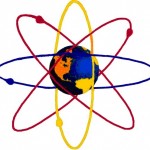Turning points: Syria and the Russian diplomacy. Stalingrad syndrome.
“Damascus is the “Stalingrad” of Russian diplomacy. After years of geopolitical withdrawal, Moscow has chosen Syria as a way to revive its image of power in the world. “Not one step back” is the Kremlin’s new strategy, as it was for the Red Army along the banks of the Volga river during World War II. To be more convincing, the Kremlin has simultaneously flexed its muscles by supplying sophisticated […]
The Ministry of Justice has received the independent report of the law firm Skadden, Arps, Slate, Meagher & Flom LLP, following its investigation of the Yulia Tymoshenko prosecution for exceeding her official powers at the conclusion of contracts between Russian Gazprom and Naftogaz Ukraine.
In accordance with the signed agreement, Skadden, Arps, Slate, Meagher & Flom LLP has delivered an independent report that clearly documents the events that were the subject of the trial and the trial itself. Through detailed analysis and a focus on the evidence, the report addresses critics, who have challenged the legal process and also the conviction, based on Yulia Tymoshenko’s claims that the prosecution was politically motivated and that her human rights have been abused. For this reason, the Ministry of Justice asked the leading international law firm to investigate the matter, taking into account all legal documents and opinions of all parties. 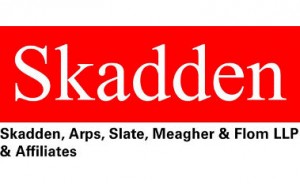
This report, published today on the Ministry’s website without amendment, concludes as groundless Yulia Tymoshenko’s claims that her prosecution was politically motivated and states that she has provided no factual evidence that would be sufficient to overturn her conviction under European or American standards.
The report also points out that Yulia Tymoshenko’s conduct in court would have been unacceptable in other countries and would likely have resulted in a contempt of court finding.
The Skadden, Arps, Slate, Meagher & Flom LLP report shows how Yulia Tymoshenko overstepped her authority and committed this crime:|
1. by drafting Directives that set forth the terms that she and Prime-minister of Russian Federation had agreed to;
2. by ordering the head of NAK Naftogaz Ukraine to sign an agreement with Gazprom in the absence of approval from the Cabinet of Ministers;
3. by threatening to fire the head of NAK Naftogaz Ukraine if he did not sign the agreement;
4. and by deceiving the head of NAK Naftogaz Ukraine into believing that the Cabinet of Ministers had approved the agreement after producing an official looking document bearing her signature and the seal of Ukraine’s Cabinet of Ministers, despite the fact no such approval had been given for the document named “Directives”.
Even where the Skadden, Arps, Slate, Meagher & Flom LLP Report questions certain procedural decisions by the court, it concludes that these decisions were based on actions by Tymoshenko designed to disrupt the court’s work.
The court concluded that Yulia Tymoshenko’s actions caused grave damage to Ukraine, since citizens of Ukraine continue to pay the highest prices in Europe for their gas due to Tymoshenko’s deal with Russia. In this sense, every citizen of this country is a victim of this crime.
The Ministry of Justice is grateful to Skadden, Arps, Slate, Meagher & Flom LLP for this professional analysis that unconditionally lays out the facts of this matter.
Contact: Press Office – Ministry of Justice
Telephone: +38 044 271 17 33
Email: press@minjust.gov.ua
«Очень трудно слушать Путина непредвзято: слишком долгая пройдена с ним семейная жизнь. И срок этой политической семейной жизни — 13 лет — он симптоматичный… 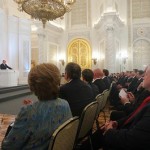
«непреодолимыми противоречиями» — так супруги называют причину в суде, чтобы не полоскать прилюдно малоприятные подробности… Но раз в год собирается семейный совет, и глава семьи рассказывает, как он видит жизнь в будущем году… Cовет этот в масштабах страны называется Посланием Федеральному собранию, и мы стали тому свидетелями… »
Статья – Матвей Ганапольский – Московский Комсомолец № 26117 от 13 декабря 2012 г.
Ukraine, the new Rada among fists and protests.
12 Dec 2012The Verkhovna Rada faction registered the Regions Party faction of 210 MPs. Yefremov was elected the head of the faction. The faction of the Batkivschyna United Opposition includes 99 MPs. The head of the faction is Arseniy Yatseniuk. The parliament also registered the UDAR Party faction of 42 deputies. The head of the faction is Vitali Klitschko. The Svoboda Party faction includes 37 MPs. The head of the faction is Oleh Tiahnybok. The faction of the Ukrainian Communist Party includes 33 MPs. It is headed by Petro Symonenko.
Five out of 450 Parliament seats remain empty after allegations of fraud and ballot-stuffing led election officials to schedule new votes in five dispute election districts. 
Lawmakers from Tymoshenko’s party showed up wearing black jerseys with her portrait on the front and the phrase “Freedom to Political Prisoners” written on the back. A fist fight began when opposition lawmakers shouting “No to defectors!” attacked two legislators, Oleksandr Tabalov and Andrei Tabalov (a father and a son), who had been elected on the opposition ticket but were suspected of preparing to defect to Yanukovych’s party. The three oppositional parties, which have a total of 178 out of the 445 filled seats at Verkhovna Rada, managed to block most of the pro-presidential Party of Regions initiatives.
Outside the building, members of the famous feminist group Femen took off their clothes to protest against the incompetence and corruption of the nation’s lawmakers.
Ad Anapa sul mar Nero si è tenuta la cerimonia della posa della prima pietra. Negli ultimi mesi la Gazprom ha proceduto a tappe forzate per arrivare all’inizio dei lavori. Uno degli obiettivi della decisione è stato quello di evitare che il Terzo pacchetto energia dell’Ue potesse bloccare o comunque ostacolare il progetto.
La potenzialità della pipeline, che cambierà le strategie per l’approvvigionamento di energia sul corridoio sud europeo, è di 63 miliardi di metri cubi di gas all’anno (circa il 10% del consumo totale di gas in Europa nel 2020). Il costo finale 16 miliardi di euro. Tempo di costruzione: 3 anni. Il South Stream evita il transito in Ucraina, protagonista di ben due guerre del gas con Mosca. 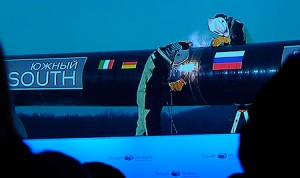
In un incontro con la stampa Marcel Kramer, amministratore delegato di South Stream Transport – il consorzio tra Gazprom (50%), Eni (25%), Edf (15%) e Wintershall (15%), preposto a realizzare il tratto offshore – ha definito la pipeline un “progetto visionario” per impegno economico e importanza strategica.
Stando alle stime dell’Agenzia internazionale dell’Energia (Iea), la domanda di gas naturale in Europa e’ destinata a salire dai 536 miliardi di metri cubi, del 2010, a 618 miliardi, nel 2035. Un aumento, all’incirca, del 15%.
Posato a una profondità massima di oltre 2.000 metri, il South Stream percorrerà 925 chilometri sotto il livello del mare, collegando Anapa con il porto bulgaro di Varna, attraverso le acque territoriali turche. Il percorso totale (2.600 chilometri), nella sua tratta onshore (1.455 chilometri), comprende anche: Serbia, Ungheria, Slovenia e Italia. Capolinea del South Stream sarà Tarvisio.
Дорога великолепно характеризует Россию и ее образ жизни. Москва все ближе к транспортному коллапсу.
3 Dec 2012«Перехватывающие парковки, новые объекты дорожной инфраструктуры, свежие правила для автолюбителей… После долгих лет пассивности московская власть наконец-то взяла на себя инициативу, чтобы постараться уменьшить риск предстоящего коллапса мегаполиса.
А разве уже не поздно? — сразу спрашиваю я себя…
Всякий раз, когда я еду по Москве и вообще по вашей стране, получаю однозначное подтверждение тому, что дорога великолепно характеризует Россию и ее образ жизни. Но давайте не философствовать… 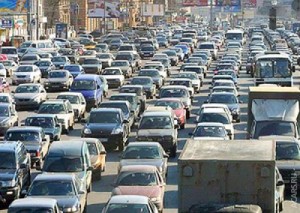
Вкратце: дороги в России — это коррумпированная среда, которая складывается из недоверия, жульничества, неумения… Конечно, добавим сюда еще неосторожность водителей (иначе как объяснить 35—40 тысяч жертв ДТП в год) и непрофессионализм строителей.
«У нас в России, — говорит моя огорченная приятельница, — никто не думает о том, как устроить удобства для населения. Все лишь пытаются извлечь какое-то личное благо». Разве она не права? … »
Статья – – Джузеппе Д’Амато Московский Комсомолец № 26107 от 1 декабря 2012 г. Giuseppe D’Amato Moskovskij Komsomolets.
Nice (France), Energy and Geopolitics Forum.
2 Dec 2012CENTRE INTERNATIONAL DE FORMATION EUROPEENNE
CLUB DE NICE
Énergie et Géopolitique
Nice, December 3rd, 4th, 5th, 2012
Energy in Europe and in the world
Round tables
– The energetic systems : crisis or mutation?
– The Arctic
– The Eastern Mediterranean area
– The Shale gas
Greenpeace has criticised Poland hosting the UN climate summit in 2013, as announced at the UN Framework Convention on Climate Change in Doha, Qatar. “A host country should be firmly committed to climate protection and be able to negotiate compromises and seal deals, but Poland has a bad track record on both counts,” says Greenpeace’s Jiri Jerabek. 
Ministers and NGOs are at the 18th Global climate change conference, which opened in Qatar on November 26th, with representatives from nearly 200 nations convening for two weeks of talks aimed at curbing global carbon emissions.
Poland has been slammed for its record on environmental issues after it blocked raising EU carbon emission targets and its decision to go ahead with shale gas extraction and building a nuclear power station.
“We have experience organizing the 2008 Conference of Parties and heading the European Union delegation at the previous climate summit,” Polish environment minister Marcin Korolec said in a message sent to the Bloomberg news agency. “We know how to grow and cut emissions. All ingredients are there for a good negotiation session.”
“We are sending a clear signal that the main priority of climate policy should be the signing of a global deal,” Korolec added. “Europe will only be able to lead the process if we manage to convince our partners to join.”
Poland hosted the UN climate summit in 2008 when 10,000 delegates attended the conference in Poznan.
Source: Polish Radio and Bloomberg
Poland, Lithuania, Russia: Respect for the dead!
30 Nov 2012Lithuanian police have arrested five people after a tomb containing the heart of Polish national hero Jozef Pilsudski was vandalised in Vilnius on November 24th. The bunch of thugs also draped a banner with the words “Poles die” and left a box with “attention bomb” and “TNT” written on it. 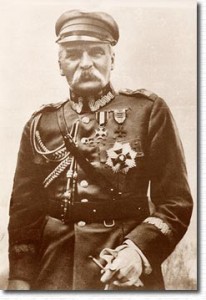
The Polish ambassador in Vilnius, Janusz Skolimowski said he has received assurances that security will be stepped up at the Rossa Cemetery. Pilsudski was born in Zulow near Vilnius, then part of the Russian empire, in 1887. After his death in 1935 his body was buried in Krakow, while his heart was taken to Vilnius.
At the same time, the Vremya news magazine on Russian Channel One reported that in 1953, when Polish authorities decided to dig up the remains of Russian soldiers who died fighting Nazi German forces in Kostrzyn nad Odra in western Poland, so as to re-bury them in large cemeteries around the country, they did so by only partially removing all the body parts.
Last October a research dig found that 102 out of 110 bodies had been re-buried with their skulls or other parts missing.
The Russian news programme claimed the “barbaric” exhumations showed a “monstrous lack of respect for the dead” and reported that Russian authorities had called on Poland to give a full explanation as to why the bodies of “soldiers who liberated Poland from Nazi Germany” were shown so little respect.
“Standards in 1953 differed significantly from those of today,” Adam Siwek from Poland’s state-backed Council for the Protection of Struggle and Martyrdom has already answered.
Source: Polish Radio
Medio Oriente, la posizione russa.
24 Nov 2012 Israeliani e palestinesi hanno i soliti scontri ciclici. In Siria assistiamo ad una guerra tra arabi. Il Cremlino difende nella regione i suoi tradizionali alleati. Questo è il quadro tracciato da Adzhar Kurtov, uno dei massimi esperti russi di Medio oriente.
“A Gaza – sostiene lo specialista dell’Istituto di ricerche strategiche di Mosca – si è osservato una lotta tra impari: una parte (gli israeliani) armata di tutto punto, l’altra (i palestinesi) no. Adesso tutto tornerà come prima, fino ad una prossima campagna”. 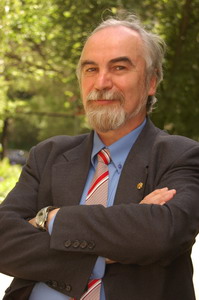
Certo, molte delle armi di Hamas sono state distrutte. Ma quale è il vero ruolo della Russia nello scacchiere mediorientale? “La Russia ha una posizione chiara sulla crisi siriana. Primo: blocco delle interferenze esterne con aiuti ai gruppi armati. Siamo di fronte ad una vera aggressione, non nascondiamocelo. Secondo: ricerca di una soluzione negoziale. Se il recente cambio di Costituzione non va bene serve definire una nuova Legge Fondamentale. Che si tengano le elezioni! Ormai vi sono gruppi di Paese, mi riferisco a quelli del Golfo in particolar modo, che riconoscono un altro governo siriano”.
Mosca mantiene ancora una qualche influenza nell’area? “La Russia non è più l’Urss. Ha meno influenza come hanno dimostrato le recenti ‘primavere’ arabe. Il Cremlino rimane però fermo sulle proprie posizioni. Prima fra tutte: difendere i propri alleati. Poi mettere il diritto internazionale davanti a qualsiasi crisi. E’ vero l’export russo di armi è importante. Ma i nostri primi compratori sono gli indiani e i cinesi”.
Non è che i Paesi del Golfo abbiano colmato quel vuoto di influenza nel Medio oriente lasciato vacante dall’Urss? “Stiamo assistendo ad uno scontro all’interno del mondo arabo. I Paesi più conservatori, mi riferisco al Qatar ed all’Arabia Saudita (entrambi sunniti), cercano di regolare i propri conti con gli sciiti. Le operazioni in Siria mirano a colpire il maggiore alleato dell’Iran (sciita). Come tutte le guerre religiose anche questa è cruenta”.
L’Occidente sembra rimasto in disparte a guardare. “Gli Stati Uniti sono interessati all’indebolimento del regime degli ayatollah ed alla sua sostituzione a Teheran con uno pro-occidentale. Il rischio di perdere il controllo della situazione è alto. L’Afghanistan dei talebani insegna qualcosa, no? A Washington, però, si è convinti di creare ad altri i problemi, non a sé stessi”.
In conclusione, tornando alla questione di Gaza come finirà? “Non credo che nel breve periodo vedremo due Stati, uno israeliano ed uno palestinese. Non v’è alcuna volontà di riconciliazione. Al massimo si potranno congelare i dissidi”.
Венгрия и Россия в постсоветской Европе.
20 Nov 2012 «Лишь 45% населения Венгрии имеет представление об истории и литературе России — такие данные обнаружило исследование общественного мнения, проведенное по просьбе Центра русистики Будапештского университета имени Этвеша Лорандата.
В ходе исследования была опрошена тысяча человек — по репрезентативной выборке. Выяснилось, что 47% населения в первую очередь определяет Москву как центр империи — или Советского Союза». …
Статья – Петер ШОМФАИ – МК 19.11.2012
Welcome
We are a group of long experienced European journalists and intellectuals interested in international politics and culture. We would like to exchange our opinion on new Europe and Russia.
Categories
- Breaking News (11)
- CIS (129)
- Climate (2)
- Energy&Economy (115)
- EU Eastern Dimension (85)
- Euro 2012 – Sochi 2014 – World Cup 2018, Sport (43)
- Euro-Integration (135)
- History Culture (198)
- International Policy (261)
- Military (74)
- Interviews (18)
- Italy – Italia – Suisse (47)
- Odd Enough (10)
- Poland and Baltic States (126)
- Religion (31)
- Russia (421)
- Survey (4)
- Turning points (4)
- Ukraine (176)
- Российские страницы (113)
Archives
- November 2020
- October 2020
- September 2020
- August 2020
- July 2020
- May 2020
- April 2020
- March 2020
- January 2020
- December 2019
- November 2019
- October 2019
- September 2019
- August 2019
- July 2019
- June 2019
- May 2019
- April 2019
- March 2019
- February 2019
- December 2018
- November 2018
- October 2018
- September 2018
- August 2018
- July 2018
- June 2018
- May 2018
- April 2018
- March 2018
- February 2018
- January 2018
- December 2017
- November 2017
- October 2017
- September 2017
- August 2017
- July 2017
- May 2017
- March 2017
- January 2017
- December 2016
- November 2016
- October 2016
- September 2016
- July 2016
- June 2016
- May 2016
- April 2016
- February 2016
- January 2016
- November 2015
- October 2015
- September 2015
- June 2015
- April 2015
- March 2015
- February 2015
- January 2015
- December 2014
- November 2014
- October 2014
- September 2014
- August 2014
- July 2014
- June 2014
- May 2014
- April 2014
- March 2014
- February 2014
- January 2014
- December 2013
- November 2013
- October 2013
- September 2013
- August 2013
- July 2013
- June 2013
- May 2013
- April 2013
- March 2013
- February 2013
- January 2013
- December 2012
- November 2012
- October 2012
- September 2012
- August 2012
- July 2012
- June 2012
- May 2012
- April 2012
- March 2012
- February 2012
- January 2012
- December 2011
- November 2011
- October 2011
- September 2011
- August 2011
- July 2011
- June 2011
- May 2011
- April 2011
- March 2011
- February 2011
- January 2011
- December 2010
- November 2010
- October 2010
- September 2010
- August 2010
- July 2010
- June 2010
- May 2010
- April 2010
- March 2010
- February 2010
- January 2010
- December 2009
- November 2009
- October 2009
- September 2009
- August 2009
Our books





